
Services in the UK’s National Health Service (NHS) are legally obliged to enforce rules on charging migrants and refugees, but clinicians working in HIV, sexual and reproductive health have significant gaps in their knowledge, according to a survey published last month in the Journal of Public Health. Seventy-one per cent said they would like more training on the topic.
“Confusion over these regulations amongst healthcare professionals risks care being inappropriately delayed or denied,” warn Dr Beth Jones and colleagues.
In order to investigate specialist clinicians’ knowledge, confidence and experience in dealing with the issue, the researchers promoted an online survey through relevant mailing lists and social media platforms. There were 343 valid responses from across the UK, mostly from doctors (64%) and nurses (24%).
Seventy eight per cent reported seeing refugees, asylum seekers or undocumented migrants in their practice. However, 45% felt ‘not so confident’ or ‘not at all confident’ in their knowledge of healthcare charging.
While most NHS services are chargeable to most people from non-European countries, some people are exempt from these charges. However, there was confusion about some of these rules:
- 64% and 71% of respondents correctly identified ‘asylum seekers’ and ‘refugees’ as being eligible for free NHS care, but other questions showed that only half of the respondents had an accurate understanding of these terms.
- 6% incorrectly thought that undocumented migrants are exempt and 21% said they were not sure.
Some NHS services are provided free to all patients regardless of immigration status.
- 73% knew that HIV treatment is free for all, but only 56% were aware that the treatment of the complications of HIV is also free. (However, treatment for co-morbidities in people with HIV is not free of charge).
- 83% and 71% correctly identified STI treatment and contraception as being free for all.
- Only half knew that treatment of conditions related to sexual or domestic violence is free of charge.
- 43% incorrectly believed that maternity care is free of charge.
- 76% believed that treatments deemed urgent and immediately necessary would be exempt from all NHS charges, when in fact these may be provided without upfront charging but still be billed later.
Case studies
The respondents were presented with four case studies and asked whether this individual would be required to pay for their healthcare.
“A 31-year old Congolese man with refugee status who has a testicular lump and is referred for an urgent ultrasound scan.” Sixty per cent correctly stated that care would be free, because of the man’s refugee status.
“A 19-year old Eritrean asylum seeker who attends for a contraceptive consultation.” Sixty-eight per cent correctly said that care would be free, both because of her current asylum application and because contraception services are exempt.
“A 36-year old HIV positive Ugandan woman who has had her asylum claim refused and is pregnant and attending maternity services.” Only 23% got the correct answer, which is different in different parts of the UK. Antenatal care would be chargeable in England and Northern Ireland, because maternity services are not exempt despite the patient’s HIV status. However, care would be free in Scotland and Wales, where refused asylum seekers are exempt from charging. Other questions showed limited awareness from Scottish and Welsh respondents about this fact.
“A 26-year old undocumented Vietnamese woman who has been trafficked into the country and is requesting a termination of pregnancy.” Sixty-one per cent correctly stated that care would be free, because she had been trafficked.
Clinicians’ concerns
In free-text comments, many respondents expressed surprise at their own lack of knowledge:
“Clearly didn’t know this as well as I thought – highlights a need for education!”
Others raised ethical concerns:
“May leave vulnerable patients not accessing care as they are worried they will have to pay.”
“I don’t want to charge any one for anything and I don’t want to know how to spot who has to pay.”
“This study demonstrates clinicians’ confusion, lack of confidence and ethical concerns around healthcare charging within sexual and reproductive health and HIV and identifies a demand for training on this topic,” conclude the researchers.
